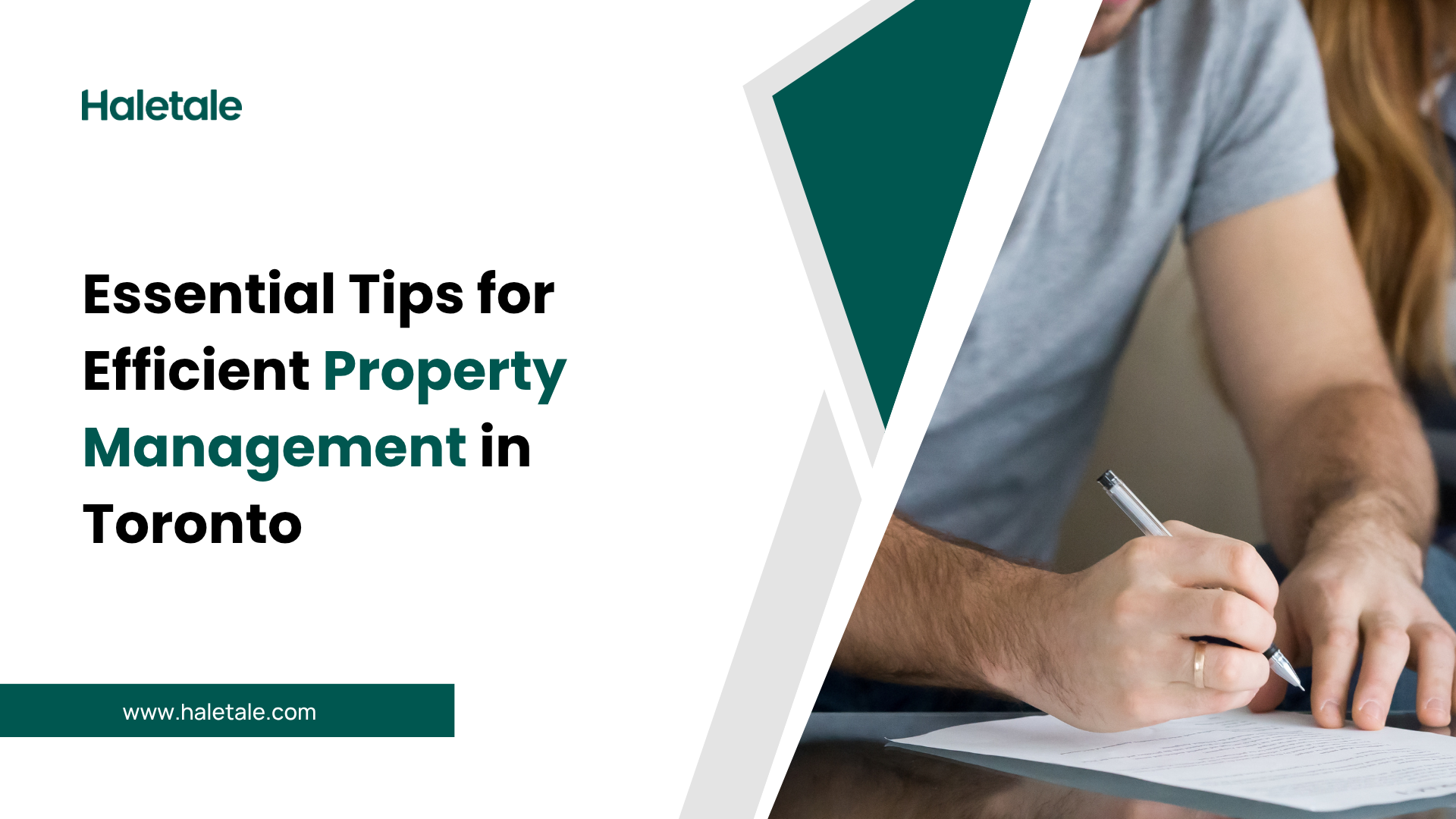Real Estate Made Simple: Essential Tips for Efficient Property Management in Toronto
They say real estate never sleeps, and nowhere is this truer than in Toronto—a bustling metropolis with a dynamic property market. Managing real estate in such a vibrant city can seem like swimming upstream, but with the right strategies, you can transform your property management approach from stressful to seamless. Navigating Toronto’s real estate scene requires more than just knowledge; it demands savvy, foresight, and adaptability. This article is your guide to understanding the core aspects of property management in this iconic city, offering practical strategies to enhance your investment’s value and ensure a smooth operation.
What if there was a way to simplify property management in Toronto’s intricate real estate market?
Key Takeaways
- Embrace current Toronto real estate trends to optimise your property management strategy
- Get to grips with local regulations to stay compliant and safeguard your investments
- Choose the right property management company by conducting thorough research and evaluation
- Implement proactive strategies in property maintenance, budgeting, and tenant relations
- Leverage technology to streamline operations and enhance efficiency
Understanding Property Management in Toronto
Effective property management in Toronto demands expertise, precision, and a heart for community engagement. You shape residences, enhance values, and ensure tenants’ satisfaction by thinking like both a property owner and a community member.
Key Aspects of Property Management
Determining the success of property management rests on certain pillars. Effective management combines seamless communication, rigorous organisation, and sound financial oversight. Blending these elements ensures not just satisfaction and property value enhancement, but also compliance with the city’s regulations, creating lawful and sustainable operations.
A keen eye for detail in these areas translates into smooth operations, satisfied tenants, and a boost for your bottom line. Property management is an intricate dance of processes, and your steps need to be sure and informed.
Regulations and Guidelines in Toronto
Toronto’s regulatory framework can be a pro or a con, depending on your preparedness. Adhering to regional guidelines is the scaffolding that supports successful property management. Understanding these labyrinthine local laws helps prevent legal hiccups, protecting your operations and investments.
Each city guideline is carefully established, with tenant rights and interests at heart, ensuring fair practices for all parties. Navigate these rules confidently to maintain smooth and continuous operations—your property’s success depends on it.
Importance of Local Knowledge in Property Management
Local insights powerfully shape management strategies. From Toronto’s lively downtown to quieter outlying areas, each neighbourhood wears a unique identity. Your awareness of community intricacies influences your property’s appeal and economic success.
Engage with regional services to streamline your management process. Fostering deeper community connections enriches property value—consider it more of an investment in relationships rather than just real estate. Local knowledge isn’t just beneficial—it’s wealth in disguise.
Understanding the Real Estate Market in Toronto
Toronto’s rental market is running hot: vacancy sits at 0.9 percent¹, the 2025 rent-increase cap is locked at 2.5 percent², and City inspectors are enforcing Municipal Code 629 with renewed zeal. If you collect rent, coordinate repairs, or handle 3 a.m. leak calls, use this guide to turn stress into systems and keep Net Operating Income (NOI) growing—even when rent caps squeeze margins.
Market Analysis and Trends
Within the bustling Canadian metropolis of Toronto, the real estate industry presents a highly intricate tapestry of fluctuating trends and economic currents. Investors and property managers alike must navigate this complexity, relying heavily on comprehensive data analysis to make informed decisions. As the economic pulse of Ontario beats steadily, recognising patterns in the property market could open lucrative doors. When it comes to making waves in the market, real estate professionals dissect both past and present trends, providing predictive insights into future market dynamics.
At first glance Toronto looks like a landlord’s dream: rents climbed another five‑and‑a‑half percent last year and nearly seven thousand new rental units opened their doors. Dig a little deeper and you realise speed matters more than price. A vacant unit today costs roughly a quarter of a percent of its annual rent for every idle 24‑hour period. That means a three‑day turn can rescue the same revenue more traditionally gained through a rent hike—except the guideline now limits that hike to 2.5 percent. In many buildings the only way to outperform is to shorten downtime, answer maintenance tickets faster than competitors and, wherever possible, introduce small fee‑based services that are not captured by the cap.
Pricing Strategies in Toronto
Navigating the pricing maze in Toronto can be a labyrinthine task, yet it’s crucial for property owners aiming to maximise their rental income and property valuation. Within this competitive market, property pricing strategies are often dictated by current market conditions, observing the ebb and flow of demand versus supply. For investors, having a finger on Toronto’s economic pulse is vital, whether in bustling downtown or the quieter neighbourhoods of Ontario landscape.
A nuanced understanding of regional pricing patterns, which frequently shift from one neighbourhood to another, can make or break your real estate endeavours. This knowledge allows owners to price their properties competitively, attracting prospective tenants in a market teeming with options. By employing strategic pricing mechanisms aligned with the locality and current market dynamics, property managers can optimise both rental yields and the long-term appreciation of their investments.
Most revenue growth now comes from creativity rather than headline rent. Many operators flag any lease that sits ten percent or more below the current CMA median and map out two consecutive guideline‑max increases while, at the same time, offering new optional services: twenty‑dollar monthly parcel lockers that guarantee secure deliveries; fifteen‑dollar pet‑wash stations that keep mud out of hallways; and ten‑dollar indoor bike racks that appeal to downtown commuters.
On the capital side, a modest forty‑five‑hundred‑dollar interior refresh—luxury vinyl plank, LED lighting and a smart thermostat—typically supports an extra one‑hundred‑and‑twenty dollars of monthly rent and reaches payback in less than three years.
Local Real Estate Regulations
The rent of any dream can quickly turn nightmarish if one’s unaware of Toronto’s local real estate regulations. These regulations impact every facet of property management, demanding thorough compliance with municipal bylaws to ensure smooth operations. Property managers who diligently adhere to these guidelines typically avoid common pitfalls, remaining on the right side of legal proceedings.
Toronto’s property managers must be well-versed in local rules and keep abreast of regulatory changes, reducing risks and protecting their investments. Failing to comply can open doors to a slew of legal complications, fines, and reputational harm. Knowledge of the governing bodies, like RECO (Real Estate Council of Ontario), offers a fortified defence against potential legal challenges while ensuring you operate within the boundaries of Ontario’s property management laws. Staying informed is not merely a suggestion but a necessity for seamless management in the region.
Implementing Effective Property Management Strategies
Sharpening your property management strategies is akin to honing a fine instrument. The results are not only more pleasing but infinitely more effective. By adopting the right approaches, you can cultivate a thriving property ecosystem that benefits both you and your tenants.
Effective Communication with Tenants
They say good fences make good neighbours—well, good communication makes great tenant relationships. Open lines between you and your tenants build a foundation of trust, which is vital for satisfaction and retention. By keeping tenants regularly updated with important happenings, you assure them they’re more than just a number to you.
Responsive and well-documented communication mechanisms aren’t just habits; they’re lifelines. Swift responses and effective dialogue resolve disputes efficiently, ensuring harmony in your property. Tenants who feel heard and valued rarely leave for greener pastures, improving your tenants’ retention rate and strengthening the tenant-manager rapport. Here, a little conversation goes a long way.
Regular Property Inspections and Maintenance
Regular inspections and continual maintenance form the backbone of a well-managed property. It’s not just the squeaky wheel that gets the grease; every part needs attention to run smoothly. Scheduled inspections allow property managers to champion preventative maintenance, catching minor issues before they snowball into costly problems.
Whether you own a chic condo or a charming vintage home, keeping track of maintenance activities is a must. Well-maintained properties ensure tenant comfort and protect the value of your investment. After all, real estate isn’t just about owning property; it’s about cultivating and nurturing it so it can reach its fullest potential. Taking these proactive steps safeguards not just the building but also the trust and loyalty of your tenants.
Budgeting and Financial Management
The heart of any property management strategy lies in solid financial planning. Detailed budgeting helps in controlling expenses with hawk-like precision. By ensuring every penny is accounted for, accurate financial management becomes less of a chore and more of a strategy to boost profitability.
Tracking income and expenditure effectively leads to informed decision-making. Budgets aren’t set in stone; they should adapt as the market conditions shift, allowing for continuous improvement and evolution. It’s about being prepared for all financial eventualities—good or bad—to ensure stability and sustainable growth. Ultimately, it’s not just about managing property but mastering the management of finances.
Maintaining Good Relationships with Tenants
The key to a successful property management business lies in building lasting relationships. A positive tenant experience can elevate your property’s reputation and ensure a harmonious community.
Creating a Positive Tenant Experience
Creating a memorable experience for tenants goes beyond clean entryways and working lifts. Positive experiences begin with thoughtful gestures, such as welcome packages or a quick ‘hello’ when they move in. Thoughtfulness can lead to increased tenant satisfaction and retention rates.
Consider hosting community events to nurture interaction and a sense of belonging. These small gestures can weave a tight-knit community within your property. When tenants feel part of something larger, they’re more likely to stay, renewing those all-important leases. Remember, happy tenants equal a happy property manager.
Handling Tenant Concerns and Disputes
Rapid response to tenant concerns is critical. It strengthens trust and signals that tenants’ well-being is your priority. Addressing complaints swiftly and empathetically helps halt issues before they escalate.
Employ mediation and constructive dialogue tools to resolve disputes efficiently. With well-documented records at your disposal, addressing concerns is both fair and systematic. Proactive measures and reliable systems not only resolve current disputes but help prevent them in future, maintaining harmony in your property community.
Tenant Retention Strategies
Effective retention starts with understanding your tenants’ needs and expectations. An in-depth survey might reveal areas for improvement and upgrades that resonate with tenant preferences. Establish your properties as desirable positions with competitive rental rates and long-term leases providing predictable income and stability.
Feedback is gold dust. Regularly seek out tenants’ opinions to inform future property management practices. Retention relies on two-way communication and a commitment to enhancing tenant satisfaction—all crucial factors in creating a lasting bond they won’t forgo easily.
Maximizing ROI Through Effective Property Management
Effective property management directly enhances your return on investment (ROI). By focusing on budgeting, property value enhancement, and cost-effective practices, you ensure that your investments yield profitable results.
Budgeting and Financial Planning
Financial planning is the rudder that steers your property management venture towards success. Aligning expenses with revenue goals requires meticulous budgeting, which serves as a guide to controlling operational costs.
Transparent accounting benefits your financial performance, allowing clear expectations to shape sound investment strategies and decisions. When financial plans are well-crafted, they provide a solid foundation for your property’s prosperity.
Strategies for Increasing Property Value
Updating and enhancing properties elevates their allure and marketability. Investing in improvements—from landscaping to energy-efficient features—not only increases value but reduces operational costs.
Amenities that align with market trends provide competitive advantages, making your property more desirable. By thoughtfully enhancing your properties, you tap into tenants’ aspirations while boosting your bottom line.
Implementing Cost-Effective Property Management Practices
Cost-effective practices are vital for maximising profit without sacrificing quality. Preventative measures reduce unexpected maintenance costs, contributing to a healthier financial outlook.
Forming strategic supplier partnerships helps lower procurement expenses, while efficient resource management increases profitability. Adopting these practices supports not just financial success but also a more sustainable approach to property management.
Leveraging Technology for Efficient Property Management
In a world where technology propels us forward, utilising digital tools isn’t just beneficial; it’s essential for staying competitive in property management. Streamlining operations and enhancing efficiency can transform your approach, saving time and money.
Utilizing Property Management Software
Imagine managing properties without being swamped by paperwork and administrative tasks. Property management software like Haletale makes this fantasy a reality. Automated systems streamline administrative processes, boosting efficiency and productivity.
The digital age brings real-time property data and analytics to your fingertips. Managers can track maintenance, leases, and finances with unparalleled convenience, turning insights into effective actions. Leveraging software isn’t just modern—it’s savvy.
A modern cloud‑based property‑management platform does more than tally rent: it generates automated Form N1s, merges resident texts with maintenance tickets, and streams real‑time financials into a dashboard so you can see arrears, expiring leases and open work orders at a glance.
Online Marketing and Listing Platforms
Cast a wider net and let potential tenants discover your properties with ease. Online platforms expand your properties’ visibility, reaching potential tenants in an increasingly digital world. Property management software like Haletale integrate with Zillow so you can easily market your properties to get qualified tenants.
Smart Home Technology for Property Management
Incorporating smart technology can set your property apart, enhancing its appeal and marketability. Tenants appreciate the convenience of automated systems—from lighting to security—providing them with an experience that feels more like the future than the present.
Smart home technologies offer energy efficiency, a sustainable approach that’s attractive for both you and potential tenants. These features allow property managers to remotely oversee operations, maintaining control and efficiency from anywhere.
Navigating Legal Aspects of Property Management in Toronto
Tackling the legal intricacies of property management can feel like deciphering a cryptic crossword. However, understanding and respecting legal frameworks is non-negotiable and integral to professional property management in Toronto.
Understanding Landlord-Tenant Laws
Stay on the right side of Toronto’s legal requirements by delving into the landlord-tenant laws. This knowledge not only aids in compliant operations but also shields you from potential disputes or litigations. Laws are ever-changing, and regular updates help you keep pace, avoiding legal pitfalls lurking around the corner.
Legal awareness ensures that you fulfil your legal obligations effectively. While staying informed may seem daunting, leveraging professional help can keep you in the loop. Consider it an investment in peace of mind, knowing your property management operations are legally sound.
Lease Agreement Best Practices
A house stands not without its foundation, and in property management, lease agreements are that foundation. Clear agreements establish the rights and responsibilities of both landlord and tenant, diminishing chances for misunderstandings that could lead to disputes.
Comprehensive lease clauses enhance the strength of your agreements, setting a precedent for all future engagements. Engaging professional legal advice ensures your documents account for every eventuality, safeguarding your interests. Adopting industry-standard agreements can streamline processes, saving time and reducing errors—thus keeping your property management operations shipshape.
Eviction Procedures and Legalities
Eviction is an unpleasant but sometimes necessary aspect of property management. Proper knowledge of eviction procedures ensures you execute this task legally, protecting your interests and professional standards.
Legal advice throughout the eviction process guides you through potential pitfalls, ensuring you comply with Ontario’s eviction laws. Handling such situations compassionately maintains your reputation—a useful asset when further engaging in Toronto’s bustling property community.
Ontario’s Residential Tenancies Act requires ninety days’ notice before any legal rent increase, and the City’s own property‑standards by‑law demands domestic hot water between forty‑five and sixty degrees Celsius, a posted elevator certificate that is no more than twelve months old, and pest‑control records that can be produced within a day of request.
The Landlord and Tenant Board’s Guideline 7 gives adjudicators wide latitude to halt an eviction if maintenance is demonstrably weak, so smart managers keep a digital “compliance vault” stocked with time‑stamped photos, signed work orders and weekly temperature logs. The discipline can feel tedious but, when the inspector knocks or the tribunal calls, the paper trail almost always decides the outcome.
Ensuring Property Compliance and Legal Responsibilities
Compliance with property regulations is a pillar of successful management. Ensuring awareness of legal responsibilities protects both property and tenants, maintaining integrity and operational smoothness.
Understanding Property Regulations in Toronto
Toronto’s complex regulatory environment demands vigilant oversight. Ensuring compliance with laws not only prevents legal entanglements but safeguards your property’s operations and reputation.
Keeping compliance frameworks up to date shields investments from unexpected penalties and fines. Regular reviews ensure your practices remain aligned with the city’s continuously evolving standards.
Legal Obligations of Property Owners and Managers
Understanding the legal duties and responsibilities of property ownership is crucial in mitigating risks. Contractual agreements should reflect a keen awareness of these obligations, reinforced by professional legal support.
Remaining compliant involves actively managing risks within an evolving landscape. Knowledge of legal obligations strengthens your ability to protect your property investments effectively.
Compliance Checklist for Property Management Operations
A compliance checklist serves as a vital tool in ensuring your property management aligns with established regulations. By conducting periodic audits, you identify improvements and address any lapses.
Documentation solidifies adherence to legal stipulations, while continuous review of compliance ensures you maintain operational excellence. In crafting this comprehensive guide, property owners and managers can manage their investments confidently and effectively through these strategically designed insights and practices.
In summary, managing property in Toronto may seem complex, but with the right strategies and knowledge, you can pave the way for success. By understanding market trends, prioritising communication, leveraging technology, and ensuring legal compliance, you’re set to transform your property management into a thriving enterprise.
How will you implement these strategies in your property management journey, and what unique challenges do you foresee in Toronto’s dynamic real estate market?
Staying Informed with the Latest News and Trends in the Real Estate Market of Toronto
Like a bird watching the clouds for impending storms, you must stay informed about market trends and news. Staying ahead of the curve offers a strategic edge in property management.
Subscribing to Real Estate Publications
Keeping a pulse on the real estate industry through publications keeps you informed of industry swings and developments. These periodical insights are key to making informed property management decisions, offering perspectives that sharpen your market understanding.
Subscribing connects you with writers and experts sharing vital knowledge, which you can pass on to peers for the benefit of rich professional networks. It’s a classic win-win, whether you’re learning or sharing.
Attending Real Estate Seminars and Workshops
Boost your knowledge by attending real estate seminars and workshops. These platforms deliver fresh insights into market trends and strategies, drawing you closer to experts and peers alike.
Seminars ignite conversation and provide valuable networking opportunities. Listening to keynote speakers’ advice can strengthen your professional skills; learning is constant and powerful. Earning new insights isn’t just beneficial—it’s exciting.
Networking with Industry Professionals
Connecting with fellow professionals unlocks opportunities to share insights, gain knowledge, and refine skills that benefit you and your career. Collaborative efforts expand horizons and foster valuable relationships.
Networking events offer informal settings to meet peers and facilitate conversations that bridge gaps between markets and strategies. These relationships aren’t just beneficial; they are transformative and elevating.
Frequently Asked Questions
1. How do I efficiently manage my property in Toronto?
Efficient property management in Toronto involves several key steps. First, make sure to regularly inspect the property for any maintenance issues. Second, communicate effectively with tenants to ensure their needs are met promptly. Third, keep detailed records of rental agreements and maintenance work. Lastly, consider hiring a professional property management company to handle day-to-day operations.
2. How can I attract quality tenants for my rental property in Toronto?
To attract quality tenants for your rental property in Toronto, it’s essential to present the property in its best light. Make sure the property is clean, well-maintained, and staged appropriately. Advertise the rental listing on reputable websites and social media platforms. Screen potential tenants carefully by conducting background and credit checks. Establish clear communication and expectations from the start to ensure a positive rental experience.
3. What are the common pitfalls to avoid in property management in Toronto?
Some common pitfalls to avoid in property management in Toronto include neglecting maintenance issues, failing to communicate effectively with tenants, setting unreasonable rental prices, and not keeping up with rental laws and regulations. It’s crucial to stay informed about the market trends and legal requirements to prevent costly mistakes and maintain a successful rental property.
4. Is it worth investing in rental properties in Toronto’s competitive market?
Investing in rental properties in Toronto’s competitive market can be financially rewarding if done strategically. While the market can be challenging, the demand for rental properties in Toronto remains strong. To succeed, focus on finding properties in prime locations, conduct thorough research, and have a solid investment plan in place. Consider seeking professional guidance from real estate experts to navigate the market effectively and maximize your investment potential.









